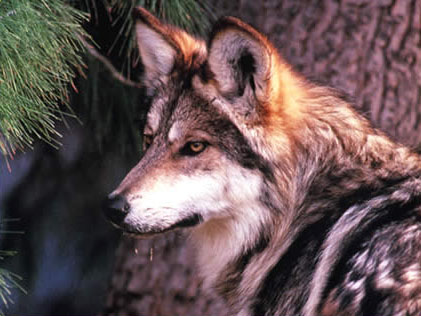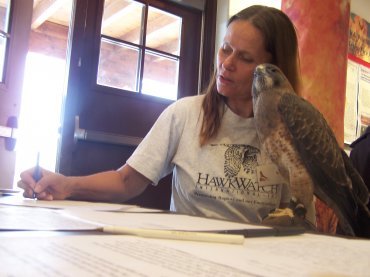In the Press: Mexican gray wolves form 2 new packs in American Southwest
 By John M. Glionna
By John M. Glionna
As Tom Buckley tells it, the Mexican gray wolf recovery program in Arizona and New Mexico has suffered some rotten luck in recent years.
At last count, some 58 wolves remained in the wild in those two states, scattered across millions of forested acres in southwestern New Mexico and southeastern Arizona.
Predictably, some of the animals have been poached by local hunters and ranchers, but their numbers have been further reduced by some freakish events:
One choked on a cow’s ear tag, and another was struck by lightning, said Buckley, a spokesman for the U.S. Fish and Wildlife Service.
But this week brings some good news for the Mexican gray wolf, which is included on the list of federally protected species: Two new wolf packs have been formed, bringing the number of packs to 14 throughout the American Southwest.
“This is great news,” Buckley told the Los Angeles Times. “It’s an indication that the system is working, that these animals are dispersing, forming packs and having the opportunity to breed. They found each other and hooked up.”
The two packs so far consist of two wolves each, but federal wildlife managers hope the animals will soon begin breeding. “¦
Authorities have been trying to return the predators to their historic range in New Mexico and Arizona for more than a dozen years, but their efforts have been shackled by illegal shootings and courtroom battles involving the powerful rancher’s lobby, which rues the wolf’s return.
The Mexican gray wolf once roamed parts of New Mexico, Arizona, Texas and Mexico, but its numbers were decimated by hunting and poaching. The animal was added to the federal endangered species list in 1976, and a captive-breeding program was started. “¦
The most recent annual survey showed at least 18 pups among the packs at the beginning of the year.
But biologists have concerns about genetic diversity within the small population. Without new wolves, inbreeding can result in smaller litter sizes and greater pup mortality. Last year, the recovery team observed 38 pups in the wild. Fewer than half survived through the end of the year.
Critics of the federal recovery program say the government needs to release more captive wolves to bolster a population that has been kept in check by poaching, a lack of new releases and past instances of trappings and lethal removals triggered by run-ins with livestock.
“The program has had its ups and downs,” Buckley said, “but the two new packs show that there is hope.”
******************************************************************************
Please write a letter to the editor today, thanking these papers for the story and urging more releases of captive wolves to increase the wild population’s genetic health and size.
The letters to the editor page is one of the most widely read, influential parts of the newspaper. One letter from you can reach thousands of people and will also likely be read by the U.S. Fish and Wildlife Service. Tips for writing your letter are below, but please write in your own words, from your own experience.
Letter Writing Tips & Talking Points
Below are a few suggestions for ensuring your message gets through clearly-your letter will be most effective if you focus on a few key points, so don’t try to use all of these. If you need additional help or want someone to review your letter before you send it, email it to info@mexicanwolves.org.
- Start by thanking the paper for publishing this article. This makes your letter immediately relevant and increases its chances of being published.
- Convey how important new releases of wolves into the wild are to increase the population’s numbers and genetic health. Even with the formation of two new packs, the wild population is still extremely small and vulnerable to threats such as disease, inbreeding, or natural events.
- Tell readers why you support wolves and stress that the majority of New Mexico and Arizona voters support the Mexican wolf reintroduction. Polling showed 69% support in New Mexico and 77% support in Arizona.
- Urge the U.S Fish and Wildlife Service to end the freeze on more releases of captive wolves into the wild. Releases of captive wolves must happen now to prevent another extinction in the wild; the number of wild wolves must increase to reduce their vulnerability.
- Encourage the U.S Fish and Wildlife Service to use all the means available to them to expedite more releases of captive wolves into the wild. The agency has been sitting on an Environmental Assessment that can end the ridiculous rule prohibiting new releases into New Mexico and letting wolves eligible for release into both Arizona and New Mexico sit in captivity. The stalling has to stop.
- Explain that there are wolves in captivity ready to be released and wolves in the wild that do not have mates. These wolves need more releases to form more new breeding pairs and families.
- Talk about your personal connection to wolves and why the issue is important to you. If you’re a grandmother wanting your grandchildren to have the opportunity to hear wolves in the wild, or a hunter who recognizes that wolves make game herds healthier, or a businessperson who knows that wolves have brought millions in ecotourism dollars to Yellowstone, say so.
- Reiterate the ecological benefits of wolves to entire ecosystems and all wildlife. Wildlife biologists believe that Mexican wolves will improve the overall health of the Southwest and its rivers and streams — just as the return of gray wolves to Yellowstone has helped restore balance to its lands and waters.
- Keep your letter brief, between 150-300 words, depending on the paper’s limit.
- Provide your name, address, occupation, and phone number; your full address, occupation, and phone number will not be published, but they are required in order to have your letter published.
- For more information, contact us at info@mexicanwolves.org
You can submit your letter to:
The LA Times (150 words or less)
The Albuquerque Journal
The Las Cruces Sun News (300 words or less)
The Durango Herald (350 words or less)
The San Francisco Chronicle (under 200 words)
Please send us a copy of your letter as well, so that we can track the actions taken to save these wonderful animals.Thank you!
Photo credits, Top to Bottom
Mexican gray wolf, courtesy of the AZ Zoological Society
Kaisa Lappalainen with raptor friend



